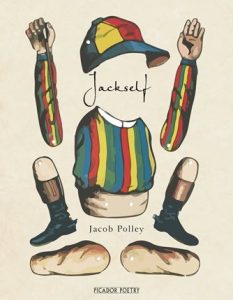Jackself (Winner, 2016 T S Eliot Poetry Prize)
 Jacob Polley is the author of four poetry collections. Previously shortlisted for the T.S. Eliot Prize, with The Brink(2003); Jackself is both a move away from the style of his previous collections, and also follows quite naturally in the same vein.
Jacob Polley is the author of four poetry collections. Previously shortlisted for the T.S. Eliot Prize, with The Brink(2003); Jackself is both a move away from the style of his previous collections, and also follows quite naturally in the same vein.
Polley’s work tends to explore eerie, curious stories and tales. Rather like Ted Hughes, Polley investigates nature’s darker aspects. The Times described this as being “poetry that imbues the everyday, the tarnished and burnished, with the possibilities of the transcendent”. The themes running through Jackself extend this further. The collection is loosely autobiographical, exploring Cumbrian landscape and memories, shapes, and childhood myths. It does this by investigating the many manifestations of “Jack” in tale and legend: Jackfrost, Black Jack, Jackskip, etc. These curious characters, alongside others like Lucy Wren, populate the collection’s landscape where the familiar is made strange, and the strange familiar.
Consider “Jack Frost”, where we meet the familiar character, going about exactly the jobs we would expect:
Jackself is tapping fractals of ice, ice ferns and berries of ice, onto windowpanes and door handles, doorsteps, grass blades and the postbox as he walks the November village after midnight.
This beautifully written lyrical introduction guides the reader panoramically , stopping to focus on small details, and feels rather Christmas card-like. Yet Jack Frost is wearing what seems to be curious fancy dress. Not a rustic costume, nor anything made of frost and snow, but rather,
complete with epaulettes of copper wire, and the lametta wig he’s kept all year in the Auto-Arctic Unit that hums in the cellar beneath Lamanby[.]
Like a parody of a Christmas scene, he now wears lametta last seen in 1970s Christmas trees, connecting the reader to Polley’s childhood. Jack Frost here becomes a humorously nostalgic, Wulzel Gummidge-type character. However, whilst Frost considers retiring early, he meets a more sinister character:
It’s Jeremy Wren, waving a glitter-sprinkled wooden spoon at the wing-mirrors of parked cars and the street lamp’s long case, baking them in frost you look a proper sight, Jackself says Wren’s weeping the lucid mask that’s welding to his cheekbones help me, he says, keep everything just as it is[.]
Wren, too, begins as a beautiful, nostalgic winter vision. But we quickly see that for Wren, freezing everything is not part of a natural seasonal cycle, but rather a desperate, delusional attempt to freeze time itself, to “keep everything just as it is”. Here, Polley’s poetry acquires a keen political relevance. In a climate of “hard Brexit” and the far right’s weaponising of nostalgia, Jeremy Wren holds glimmers of some politicians desperate to recover a non-existent British “golden age” In poetry focused on folk-tale and myth, necessarily searing political relevance keeps the collection contemporary and fresh.
Political and social observations balance Polley’s investigation of traditional rhyme forms beautifully. In “Every Creeping Thing”, before Polley introduces Jackself, a dark incantation must take place, the sort of childish chanting of nursery rhymes that fills British 1970s golden-era horror films:
By leech, by water mite by the snail on its slick of light by the mercury wires of the spiders’ lyres and the great sound-hole of the night[.]
Earth’s creeping, crawling things are sworn upon, counted out as constants, as lode-stones by which things can occur. There is a deliciousness of disgust, revelling in nature’s less desirable, less often noticed aspects. When Jackself does appear, he is utterly terrifying:
instead of a soul Jackself has a coal and the High Fireman to pay[.]
A soulless, glowing creature without obvious body, Jackself is possibly in league with the devil (the “High Fireman”) or at the very least enslaved to a more powerful creature; the stuff of childhood nightmares.
Polley has assembled a powerful,disturbing collection, quite unlike anything else in contemporary poetry. Strange and unsettling, it lingers , the nursery-rhymes worming their way into the ear.
Alice Tarbuck

Leave a Reply